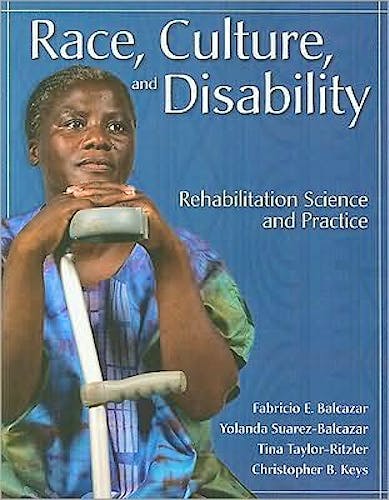

No hay productos en el carrito



Race, Culture and Disability. Rehabilitation Science and Practice
Balcazar, F. — Suarez-Balcazar, Y. — Taylor-Ritzler, T. — Keys, C.
1ª Edición Junio 2010
Inglés
Tapa blanda
418 pags
1200 gr
null x null x null cm
ISBN 9780763763374
Editorial JONES AND BARTLETT
LIBRO IMPRESO
-5%
58,07 €55,17 €IVA incluido
55,84 €53,05 €IVA no incluido
Recíbelo en un plazo de
2 - 3 semanas
Description
Race, Culture and Disability: Rehabilitation Science and Practice is a guide to understanding the research and practical issues related to race, culture and disability in rehabilitation services. Due to an increase in ethnically diverse individuals with disabilities, this text is an extremely timely and relevant contribution for researchers, practitioners, and students.
Race, Culture, and Disability brings together the work of leading researchers to explore issues of race, culture, and disability in rehabilitation science and practice. This unique book provides researchers and evidence-based practitioners with scientific resources to answer practical and knowledge-based questions and resolve natural tensions.
Topics such as how to make disability determinations with people from diverse cultural backgrounds and non-English language populations and how to address issues of cultural competence and cultural mistrust in service provision are clearly presented. The book is enriched by the perspectives of the scientists who conduct research, the people of color with disabilities who live in this intersection, the practitioners who work with diverse populations, and the students and recent graduates who have learned and want to learn more about this research area.
Features:
• Key topics including disability identity, psychological testing, community
infrastructure, employment issues and more. • Includes 15 primary chapters
that focus on conceptualizing and understanding the nature of disparities in
rehabilitation access, use and outcomes, and present models for reducing these
disparities.
• Three additional chapters offer integrative commentaries on the primary
chapters from the perspectives of researchers, practitioners and students.
• Examples and case studies though out as well as an annotated bibliography
and a glossary of key concepts serve to enhance student learning.
Table of Contents
Chapter 1 Introduction: Examining the Nexus of Race, Culture and Disability
Chapter 2 “Ways of Seeing” in Race and Disability Research
Chapter 3 Disability Identity and Racial-Cultural Identity Development: Points
of Convergence, Divergence, and Interplay
Chapter 4 Psychological Testing and Multicultural Populations
Chapter 5 Access to Vocational Rehabilitation Services for Black Latinos with
Disabilities: Colorism in the 21st Century
Chapter 6 Challenges to Providing Culturally Competent Care in Medical Rehabilitation
Settings: Defining an Evidence-Based Behavioral Research Agenda and Examining
Recent Advances with African Americans
Chapter 7 Cultural Diversity and How It May Differ for Programs and Providers
Serving People with Psychiatric Disabilities
Chapter 8 Community Infrastructure and Employment Opportunities for American
Indians and Alaska Natives with Disabilities Living on Tribal Lands
Chapter 9 Employment and Rehabilitation Issues for Racially and Ethnically Diverse
Women with Disabilities
Chapter 10 Cross-Cultural Issues for Asian Pacific Americans with Disabilities
in the Vocational Rehabilitation System
Chapter 11 Cultural Competence Education in Rehabilitation
Chapter 12 A Three-Dimensional Model for Assessing People with Disabilities
from Multicultural Backgrounds
Chapter 13 Theory and Research on Ethical Decision-Making Models: Implications
for Multicultural Rehabilitation Counseling
Chapter 14 Cultural Competence: A Review of Conceptual Frameworks
Chapter 15 Evaluation Capacity Building: A Cultural and Contextual Framework
Chapter 16 A Systems Approach to Placement: A Culturally Sensitive Model for
People with Disabilities
Chapter 17 Exploring Cultural Competence: Implications for Research
Chapter 18 Race, Disability & Culture: Implications for Practice in Rehabilitation
Chapter 19 Race, Culture, and Disability: Implications for Training and Educating
Future Generations
Chapter 20 Conclusion: How race, culture and disability intersect: Pragmatic
and generative perspectives
About the Author(s)
- Fabricio E. Balcazar, PhD-Professor, Department of Disability and Human Development, University of Illinois at Chicago, Chicago, Illinois
- Yolanda Suarez-Balcazar, PhD-Professor, Department of Occupational Therapy, University of Illinois at Chicago, Chicago, Illinois
- Tina Taylor-Ritzler, PhD-Project Director, Center for Capacity Building on Minorities with Disabilities Research, University of Illinois at Chicago, Chicago, Illinois
- Christopher B. Keys, PhD-Professor, Department of Psychology, DePaul University
Chicago, Chicago, Illinois
© 2025 Axón Librería S.L.
2.149.0